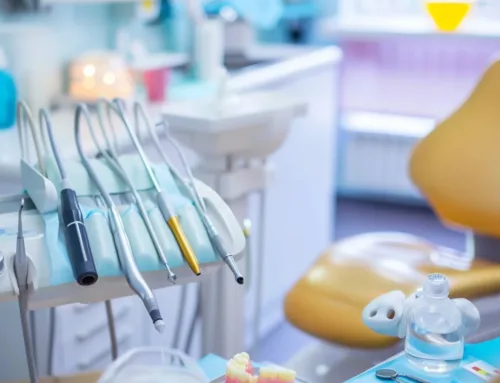Possible Causes & Treatments for Sudden Tooth Sensitivity
If you don’t normally experience sensitive teeth, having a sudden sharp pain or uncomfortable sensation in one or more teeth can be unsettling and concerning. In most cases, these instances of sudden tooth sensitivity are easily explained and simple to treat. However, there are other situations where unexpected tooth sensitivity could be a warning sign of other dental health problems and should be looked at by a dentist promptly.
Many people experience occasional sensitivity in their teeth from time to time. It’s usually temporary and no cause for alarm, and often can be explained by a number of common situations. With that said, if you are not typically susceptible to sensitivity in your teeth and begin to notice unpredictable instances of heightened discomfort or sudden pain in your teeth, you should certainly take note and monitor the situation closely along with a visit to your dentist to investigate what might be causing it.
Treating mild cases of tooth sensitivity is usually quite easy, and when managed properly, these preventive measures can relieve most or all of the discomfort associated with sensitive teeth. On the other hand, if the underlying cause is something more significant, then a more intensive examination from your dentist will be necessary to determine the best course of treatment. To give you a general idea on what the possible causes of sudden tooth sensitivity might be, we’ve compiled several of the most common instances where tooth sensitivity is a common symptom.
When Might Tooth Sensitivity Be Expected?
For starters, there are some situations that people find themselves in where heightened sensitivity in the teeth is not unusual, and in fact can be quite common. For example, when teeth are exposed to extreme temperature changes, it can cause the nerves inside the teeth to react with signals of pain or discomfort. If you’ve ever bitten into ice cream and felt a sharp sensation emanating from your teeth, or taken a sip of very hot coffee and had a similar feeling, then you’ll have an understanding of this. Nevertheless, if the discomfort when eating hot or cold foods becomes worse, more frequent, or won’t subside, then you will want to book an appointment to consult with your dentist.
In addition, there are some dental procedures that can leave the teeth in a temporary condition of having greater sensitivity. An example of this is a professional tooth whitening treatment. The compounds used to bleach and whiten teeth are known to have the temporary side-effect of increasing tooth sensitivity for some patients. While this usually fades over a few days, it can be quite alarming if you’re not prepared for it and don’t typically have sensitive teeth. If you’ve had a whitening treatment within the last 2-3 weeks and are experiencing tooth sensitivity, it’s best to avoid very hot or very cold food and drink until the effects have subsided. If the sensitivity lingers for longer than 3-4 weeks, contact your dentist for a follow-up appointment at your earliest opportunity to see if there may be another underlying cause.
Intensive tooth cleaning treatments that involve a great deal of scaling on the teeth to remove hardened tartar can also leave the teeth and gums feeling a bit more sensitive than normal. Again, like with the lingering effects of tooth whitening treatments, the heightened sensitivity usually subsides after a week or so. In the event that it does not, or the discomfort worsens, book an appointment to speak with your dentist and have a follow-up examination performed to see if there are other factors at play.
If your tooth sensitivity can’t be readily explained by situations like these, or if the sensitivity persists for more than 3-4 weeks, it’s likely that the cause is due to other dental health reasons. There are many different dental conditions of varying severity that can have the effect of increasing sensitivity of the teeth. Let’s explore some of the most common dental problems that can include sensitive teeth as one of the symptoms.
Cavities & Tooth Decay
Poor oral health care habits and frequently ingesting food and drink that has high sugar or acidic content will accelerate the process of erosion on the hard protective enamel of your teeth. As this enamel weakens and becomes thin, cavities can form that go deep into the inner dentin of the teeth and towards the soft inner pulp where the nerves are located. When this happens, the cavity can act as a direct path for cold, heat, and acids to reach the more sensitive parts of the teeth and cause sharp pains and significant discomfort. Cavities will continue to grow if left untreated, and the severity of the sensitivity will also increase. Filling the cavity will treat the existing situation, however if the extent of the decay is too severe or the tooth becomes infected, a root canal or tooth extraction may be necessary. Afterwards, improved daily oral care habits & regular dental checkups will be essential to prevent decay from affecting the teeth again in the future.
Receding Gums & Periodontitis
Another condition that may result in increased tooth sensitivity is gum recession caused by periodontitis, also known as gum disease. Gum disease is an infection that occurs in the gum tissue surrounding the teeth, causing the soft areas of the gums to pull away from the teeth and expose a greater portion of the tooth roots. As the gums recede and more of the tooth becomes exposed to the acidic environment of the mouth, causing hot and cold food and drinks to produce pain and discomfort in the gums and in the teeth. Gum disease can be treated with a combination of oral hygiene treatments, antibiotics, and improved at-home oral health habits. Advanced cases of gum disease can be very serious, even life threatening if left untreated, so it’s critical to seek proper treatment as promptly as possible.
Cracked or Chipped Teeth
Similar to how cavities and exposed roots increase the sensitivity of teeth, so too can cracks and chips that occur due to accidental impacts to the teeth and jaw. Sometimes, chips and cracks in the teeth can be so small as to make them difficult to visually identify, but they still compromise the structural integrity of the teeth and can create pain and soreness while chewing or talking. If you recently experienced an accidental impact to the mouth or jaw, and are now noticing increased sensitivity in one or more teeth, you should book an appointment to see your dentist as soon as possible. Cracks and chips can be repaired using dental bonding, dental crowns, dental veneers, and other methods, but it’s important to treat the damaged tooth promptly before it worsens.
Nighttime Teeth Grinding or Clenching
Tooth grinding and subconscious clenching of the jaw are very common occurrences for many people, most often taking place during sleep. This frequent exertion of pressure on the jaw and teeth has multiple negative effects, including accelerated wearing of the enamel of the teeth where they grind together, headaches, and general soreness in the face and neck. The excessive pressure on the teeth from grinding and clenching can also cause the gums and nerves in the teeth to become irritated, inflamed, and sore, making them more susceptible to being sensitive when in contact with hot or cold food and drinks. If you grind your teeth, your dentist can fit you for a night-time dental mouthguard to wear when you sleep. This will prevent tooth grinding and relieve the pressure while you sleep, and the sensitivity should gradually dissipate over time.
Methods for Dealing with Tooth Sensitivity
If your tooth sensitivity is caused by any of the more serious conditions listed above, you’ll need to arrange for an appointment with your dentist. Restorative dental work to fix damaged teeth, fill cavities, treat gum disease, and obtain protective mouthguards is of vital importance to help reverse the effects and stop tooth sensitivity from worsening. In addition, there are many preventive measures that can be taken such as fluoride treatments to strengthen tooth enamel, dental sealants to guard against tooth decay, and orthodontics to correct bite pattern problems that lead to tooth grinding.
In addition to these clinical treatments for tooth sensitivity, there are other at-home methods you can employ to help mitigate the effects of sensitive teeth. In some cases, changing to a sensitivity toothpaste is all it takes to get relief and improve the comfort of enjoying hot or cold food and drink. A general improvement to at-home oral hygiene routines to increase the frequency of brushing, flossing, and antibacterial oral rinses can also guard against tooth decay and gum recession and prevent them from causing a rise in tooth sensitivity. Sticking to the recommended schedule of dental checkups and professional tooth hygiene appointments is also very important, so if it’s been a while since you’ve visited your dentist, now’s the time to get back on track!
Contact Georgian Dental today to book your next appointment! We’ll be glad to speak with you on the subject of tooth sensitivity and answer any questions or concerns you may have. We look forward to seeing you soon!
Appointment Request
If you’re interested in any of our procedures, and would like to meet with one of our dentists to discuss options, costs and get additional information, complete this short form and we’ll give you a call to arrange for a no-obligation appointment at our Barrie clinic.










